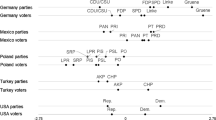Abstract
In this study, we analyze the voting records of U.S. senators on three recent international trade bills. Our objective is to assess the importance of ideology and constituent interest as forces that influence protectionist vs. free trade voting behavior. The methodology uses discriminant analysis supplemented with expert judgement. The first conclusion is that ideology is the more important force in generic protectionism issues, and local constituent interests are more important for commodity-specific issues. Second, we find that protectionism is especially associated with liberal ideology, high import impact, and low export dependence. Although the discriminant analysis outperforms expert judgement in classifying protectionist vs. free trade votes in two of the three bills studied, the best explanation is obtained by using both methods together.
Similar content being viewed by others
References
Aldrich, J.H. and Nelson, F.D. (1984). Linear probability, logit, and probit models. Beverly Hills: Sage.
Almanac of American Politics, 1986 (1985). Washington, DC: National Journal, Inc.
Annual survey of manufacturers (1985). Origin of exports, 1983 and 1984 editions, Tables 2 and 3. Washington, DC: U.S. Government Printing Office.
Baldwin, R.E. (1985). The political economy of U.S. import policy. Cambridge, MA: MIT Press.
Bauer, R.A., De Sola Pool, I. and Dexter, L.A. (1972). American business and public policy, 2nd ed. Chicago: Aldine-Atherton, Inc.
Bhagwati, J. (1964). The pure theory of international trade: A survey. Economic Journal 74 (293): 1–84.
Blake, D.H. and Walters, R.S. (1987). The politics of global economic relations, 3rd ed. Englewood Cliffs, NJ: Prentice Hall.
Congressional Quarterly Almanac 1987 (1987). 33: 1383, 1384, 1511–1513. Washington, DC: Congressional Quarterly, Inc.
Congressional Quarterly Almanac 1985 (1985). 31: 255–259. Washington, DC: Congressional Quarterly, Inc.
Congressional Quarterly Almanac 1984. (1984) 30: 171–176. Washington, DC: Congressional Quarterly, Inc.
Coughlin, C.C. (1985). Domestic content legislation: House voting and the economy theory of regulation. Economic Inquiry 23: 437–488.
Czinkota, M.R. (1986). Trade policy and Congress. Columbia Journal of World Business 20 (4): 71–77.
Destler, I.M. (1986). American trade politics: System under stress. Washington, DC: Institute for International Economics.
Destler, I.M. and Odell, J.S. (1987). Anti-protection: Changing forces in U.S. trade politics. Washington, DC: Institute for International Economics.
Frey, B.S. (1984). The public choice view of international political economy. International Organization 38 (1): 199–223.
How Congress voted — a 1984 scorecard on workers' issues (1984). AFL-CIO News 29 (42).
How they voted — second session, 98th Congress. (1986). The Business Advocate (January): 1A–8A.
Krugman, P.R. (Ed.) (1986). Strategic trade policy and the new international economics. Cambridge, MA: MIT Press.
Lenway, S.A. (1985). The politics of U.S. international trade: Protection, expansion, and escape. Boston: Pitman.
Levinson, M. (1988). Is strategic trade fair trade? Across the Board (June): 47–51.
Maddala, G.S. (1983). Limited dependent and qualitative variables in econometrics. Cambridge: Cambridge University Press.
McArthur, J. and Marks, S.V. (1988). Constituent interest vs. legislator ideology: The role of political opportunity cost. Economic Inquiry 26 (July): 461–470.
Morrison, D.A. (1969). On the interpretation of discriminant analysis. Journal of Marketing Research 6 (May): 156–163.
Ohlin, B. (1933). Interregional and international trade. Cambridge, MA: Harvard University Press.
Pastor, R.A. (1980). Congress and the politics of U.S. foreign economic policy. Berkeley: University of California Press.
Press, S.J. and Wilson, S. (1978). Choosing between logistic regression and discriminant analysis. Journal of the American Statistical Association 73 (364): 699–705.
Pugel, T.A. and Walter, I. (1985). U.S. corporate interests and the political economy of trade policy. Review of Economics and Statistics 67 (3): 465–472.
Ricardo, D. (1963). On the principles of political economy and taxation. Homewood, IL: Irwin. (Originally published in London in 1819).
Riddlesperger, J.W. and King, J.D. (1982). Energy votes in the U.S. Senate, 1973–80. Journal of Politics 44: 838–847.
Saltzman, G.M. (1987). Congressional voting on labor issues: The role of PACs. Industrial and Labor Relations Review 40 (2): 163–179.
Schattschneider, E.E. (1935). Politics, pressures, and the tariff. New York: Prentice Hall.
Statistical Abstract of the United States 1987 (1987). Table 668, p. 393. Washington, DC: U.S. Government Printing Office.
Tosini, S.C. and Tower, E. (1987). The textile bill of 1985: The determinants of Congressional voting patterns. Public Coice 54 (1): 19–25.
Whalen, R.J. (1986). Trade warriors. Washington, DC: WIRES Press.
Author information
Authors and Affiliations
Additional information
We are indebted to Dennis Quinn, Tom Brewer, Michael Czinkota, Karen Gaertner, Annette Shelby, and Melanie Hayes. Errors remain our responsibility.
Rights and permissions
About this article
Cite this article
Nollen, S.D., Iglarsh, H.J. Explanations of protectionism in international trade votes. Public Choice 66, 137–153 (1990). https://doi.org/10.1007/BF00127798
Issue Date:
DOI: https://doi.org/10.1007/BF00127798




